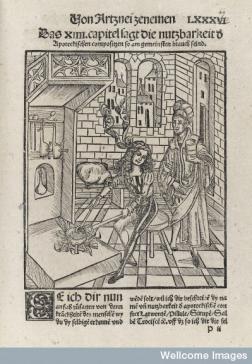This project looked at vernacular texts in early modern Germany, medical pamphlets, bestselling Arzneybuecher (collections of remedies) and manuals for Galenic medicine, against the more complete context of the learned world of medical knowledge. More specifically, it looked at texts published by authors who identified themselves in print as municipal physicians. So far Hannah Murphy has identified at least 36 authors in the sixteenth century who published vernacular works in which they claimed to be municipal physicians. Some of these authors, for example, Johannes Dryander, Johannes Winter von Andernach, Georg Pictorius, and Adam Zwicker, are better known for their learned Latin writings. Others, like Holb Fincel who was town physician in Zwickau, Hektor Mithoff, who worked in Hannover and Christoph Ostwald, who lived in Konstanz, neither achieved fame nor survived in historical record. Some of the texts went through multiple editions, like Melchior Sebizio’s Buch von dem Feldbaw, which became the foundation for multiple other works by authors including Lemnius Levinus and Georg Marius, while others were ephemeral, single-purpose pamphlets, which survive in fragments or excerpts.
Looking at the construction of authorship in these texts, the kind of knowledge they contain, their readership and intended circulation, this project questioned the assumption that vernacular texts displaced the traditional learned authority of philosophical Galenic medicine. Instead Murphy argued that the proliferation of certain texts by learned authors was part of a new construction of medical expertise, one that encompassed empirical or practical experience and claimed it as the preserve of learned practice. This had professional dimensions. Municipal physicians in the sixteenth century gradually won a set of privileges enshrining their position in the medical marketplace. They used their publications both as a forum in which to present their professional identity, and as a tool in its construction. Their use of empirical evidence also had implications for medical knowledge. The sociology of medical knowledge (who knew what, how they knew it, and who was supposed to know it) was always complex and the new tools of the Renaissance changed it further. At its furthest reaches, the project argues that in the field of medicine vernacular material was used with pointed purpose to spread some information and withhold other. Reading vernacular texts written by educated practicing physicians allows us to see these two aims—the social and the epistemological—together. By examining medical publications as one tool of what contemporary physicians themselves termed a "medical reformation," this project illustrates the disciplining effect of vernacular texts in terms of the codification of patient behaviour, the focused structure of medical learning, and the withholding of necessary procedural information.

